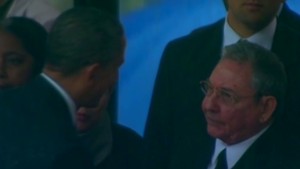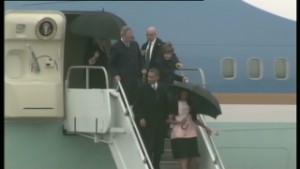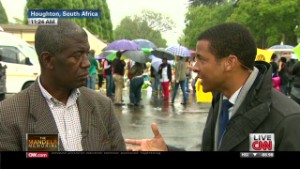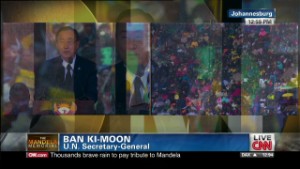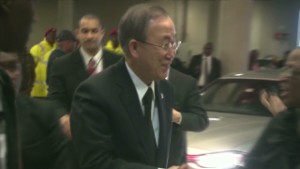http://edition.cnn.com/2013/12/10/politics/mandela-obama-remarks/index.html
Johannesburg, South Africa (CNN) -- To Graça Machel and the
Mandela family; to President Zuma and members of the government; to heads of
state and government, past and present; distinguished guests -- it is a singular
honor to be with you today, to celebrate a life unlike any other.
To the people of South Africa --
people of every race and walk of life -- the world thanks you for sharing Nelson
Mandela with us. His struggle was your struggle. His triumph was your triumph.
Your dignity and hope found expression in his life, and your freedom, your
democracy is his cherished legacy.
It is hard to eulogize any man --
to capture in words not just the facts and the dates that make a life, but the
essential truth of a person -- their private joys and sorrows; the quiet moments
and unique qualities that illuminate someone's soul. How much harder to do so
for a giant of history, who moved a nation toward justice, and in the process
moved billions around the world.
Born during World War I, far from
the corridors of power, a boy raised herding cattle and tutored by elders of his
Thembu tribe -- Madiba would emerge as the last great liberator of the 20th
century.
http://edition.cnn.com/2013/12/10/politics/mandela-obama-remarks/index.html

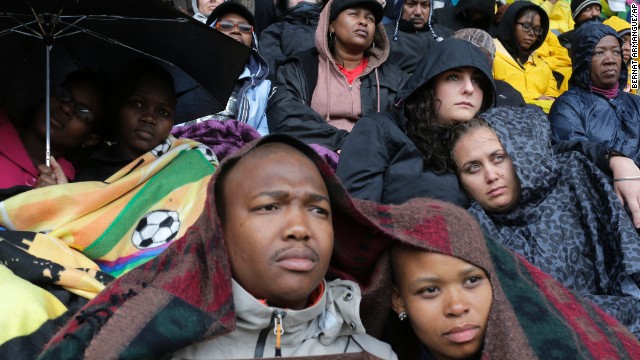 People take shelter under blankets and umbrellas during the
memorial service for former South African President Nelson Mandela at FNB
Stadium in Johannesburg on Tuesday, December 10. Thousands of South Africans and
more than 90 heads of state gathered to honor the revered leader, who died
Thursday, December 5. He was 95.
People take shelter under blankets and umbrellas during the
memorial service for former South African President Nelson Mandela at FNB
Stadium in Johannesburg on Tuesday, December 10. Thousands of South Africans and
more than 90 heads of state gathered to honor the revered leader, who died
Thursday, December 5. He was 95.
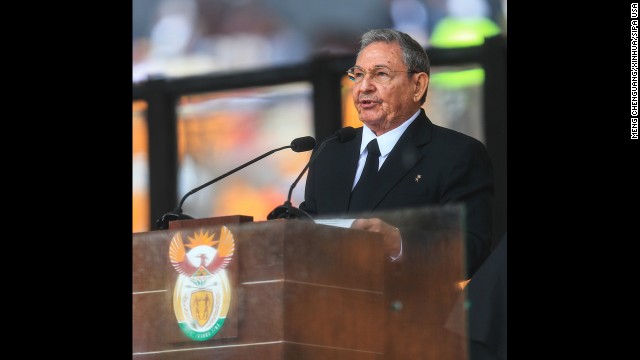 Cuban leader Raul Castro addresses the state memorial
service for Mandela.
Cuban leader Raul Castro addresses the state memorial
service for Mandela.
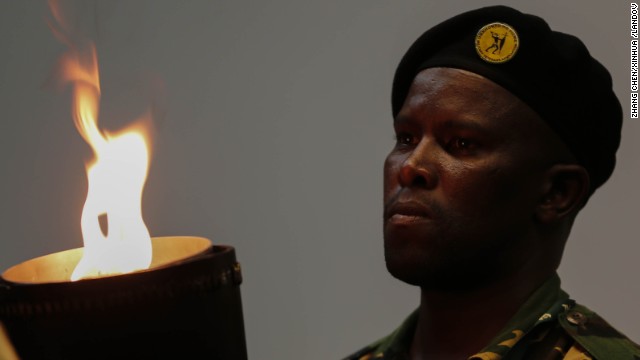 A South African soldier watches the flame of the torch
before entering the field during the memorial service.
A South African soldier watches the flame of the torch
before entering the field during the memorial service.
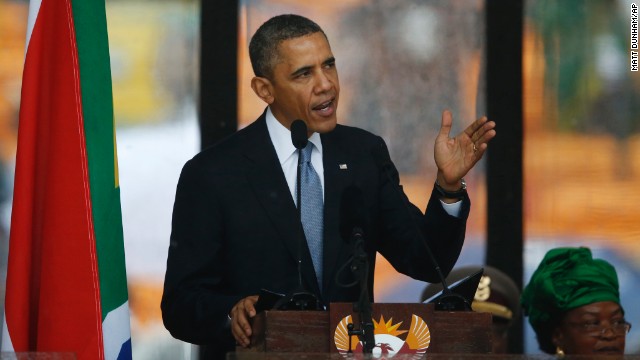 President Barack Obama addresses the crowd during the
memorial service.
President Barack Obama addresses the crowd during the
memorial service.
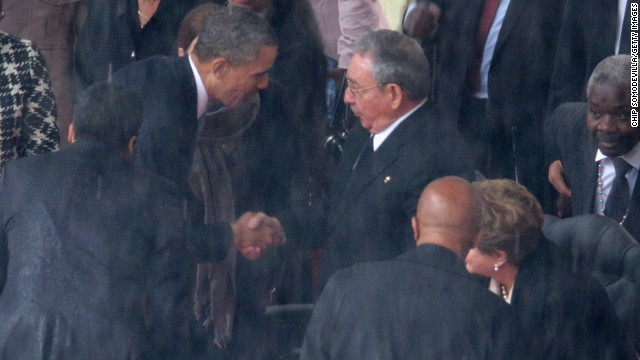 Obama shakes hands with Cuban President Raul Castro just
before speaking.
Obama shakes hands with Cuban President Raul Castro just
before speaking.
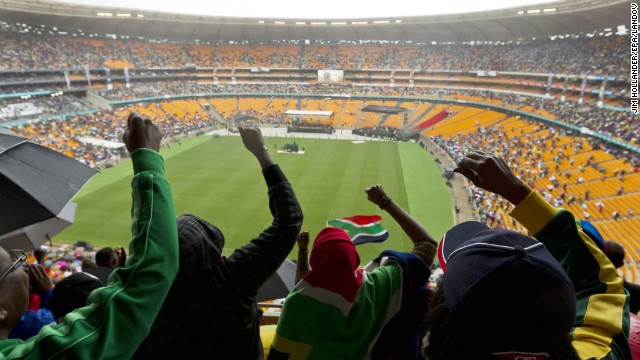 South Africans cheer during the memorial service.
South Africans cheer during the memorial service.
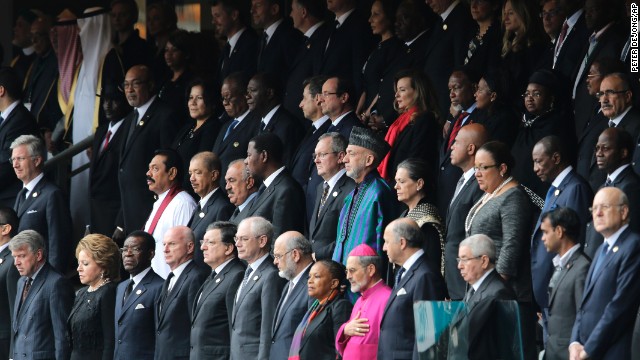 Dignitaries from all over the world stand at the beginning
of the memorial service.
Dignitaries from all over the world stand at the beginning
of the memorial service.
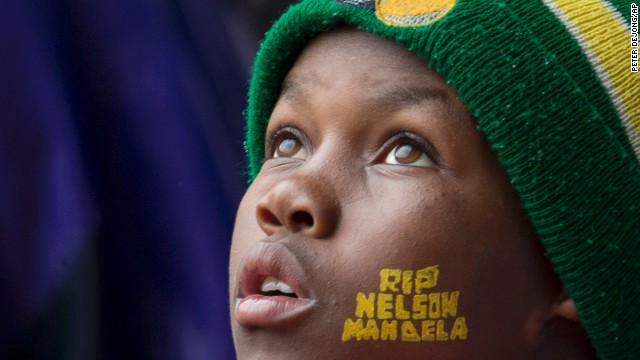 A boy looks up during the memorial service at FNB Stadium.
He has "RIP Nelson Mandela" painted on his face.
A boy looks up during the memorial service at FNB Stadium.
He has "RIP Nelson Mandela" painted on his face.
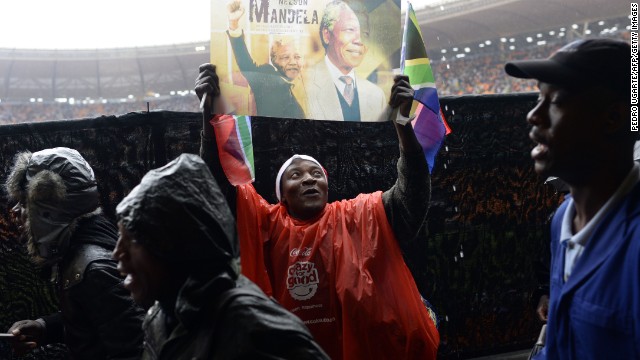 A man displays a sign with pictures of Mandela during the
memorial service.
A man displays a sign with pictures of Mandela during the
memorial service.
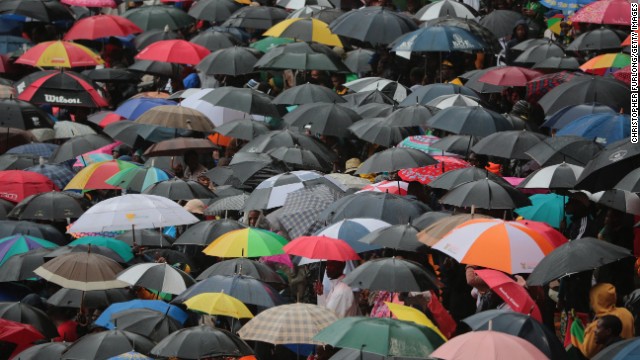 People take shelter under umbrellas at FNB Stadium.
People take shelter under umbrellas at FNB Stadium.
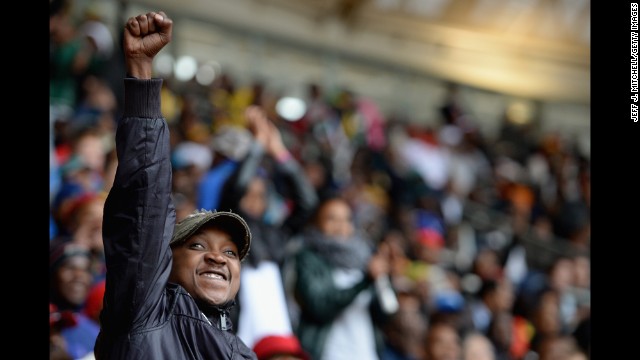 A man raises his fist during the memorial service.
A man raises his fist during the memorial service.
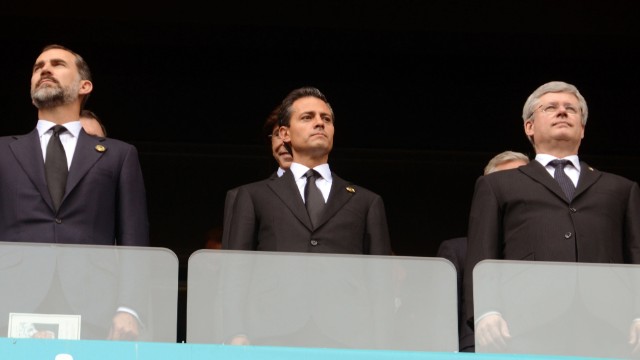 This handout photo released by Mexican presidency press
office shows (L-R) Spanish Prince Felipe de Borbon, Mexican President Enrique
Pena Nieto an Canadian Prime Minister Stephen Harper on December 10, 2013, while
attending the funeral of Nelson Mandela at Soccer City stadium in Johannesburg,
South Africa. AFP PHOTO/ MEXICAN PRESIDENCYHO/AFP/Getty Images
This handout photo released by Mexican presidency press
office shows (L-R) Spanish Prince Felipe de Borbon, Mexican President Enrique
Pena Nieto an Canadian Prime Minister Stephen Harper on December 10, 2013, while
attending the funeral of Nelson Mandela at Soccer City stadium in Johannesburg,
South Africa. AFP PHOTO/ MEXICAN PRESIDENCYHO/AFP/Getty Images
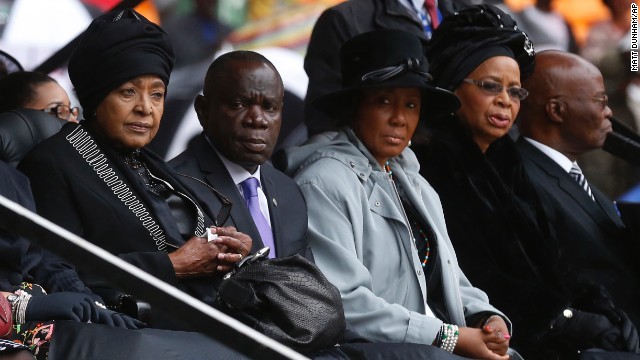 Mandela's ex-wife, Winnie Madikizela-Mandela, left, and
his widow, Graca Machel, right, sit near each other during the memorial
service.
Mandela's ex-wife, Winnie Madikizela-Mandela, left, and
his widow, Graca Machel, right, sit near each other during the memorial
service.
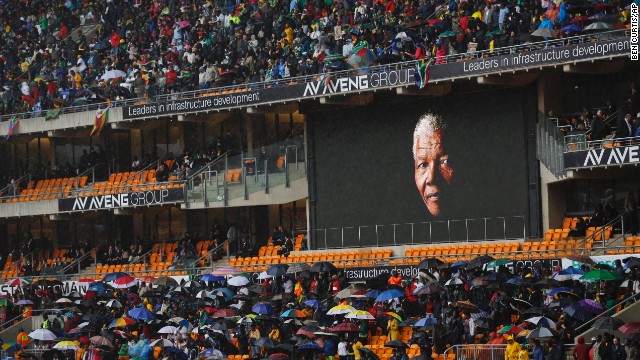 Mandela's face looms large on a billboard inside FNB
Stadium.
Mandela's face looms large on a billboard inside FNB
Stadium.
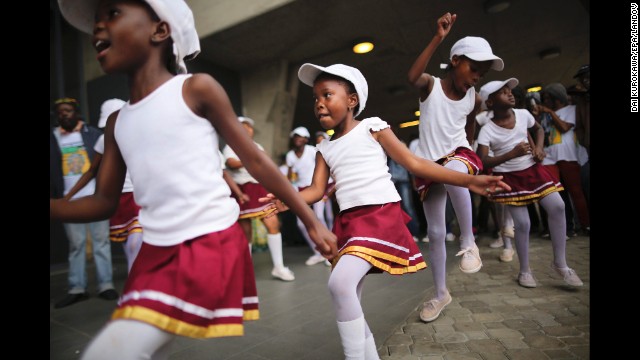 Girls dance during the memorial service at FNB
stadium.
Girls dance during the memorial service at FNB
stadium.
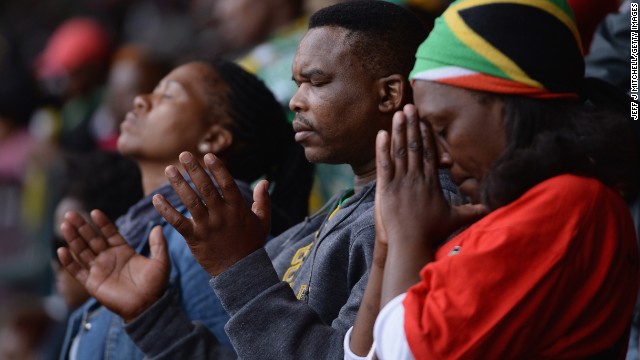 Mourners pause for a prayer during the memorial
service.
Mourners pause for a prayer during the memorial
service.
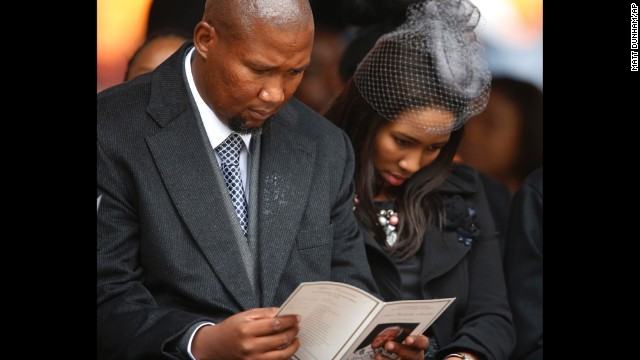 Mandla Mandela, left, grandson of Nelson Mandela, attends
the memorial service.
Mandla Mandela, left, grandson of Nelson Mandela, attends
the memorial service.
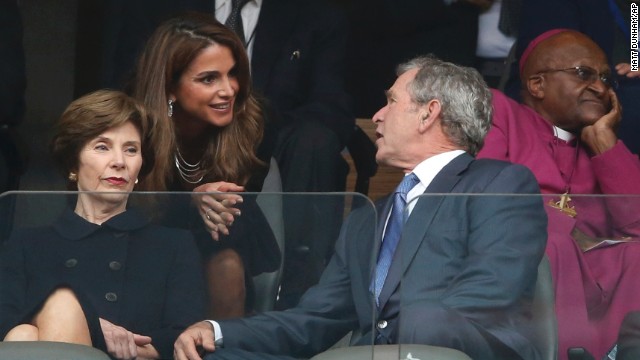 Queen Rania of Jordan speaks with former President George
W. Bush and his wife, Laura, during the memorial service.
Queen Rania of Jordan speaks with former President George
W. Bush and his wife, Laura, during the memorial service.
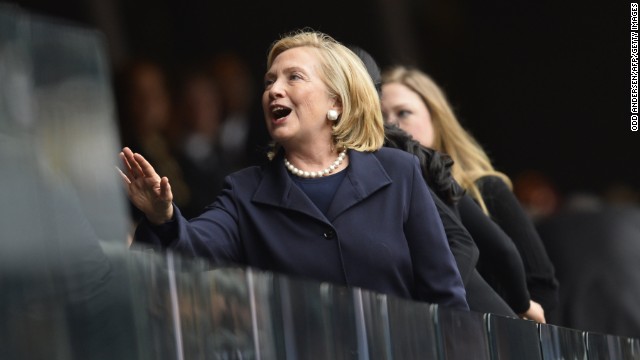 Former Secretary of State Hillary Clinton arrives for the
memorial service.
Former Secretary of State Hillary Clinton arrives for the
memorial service.
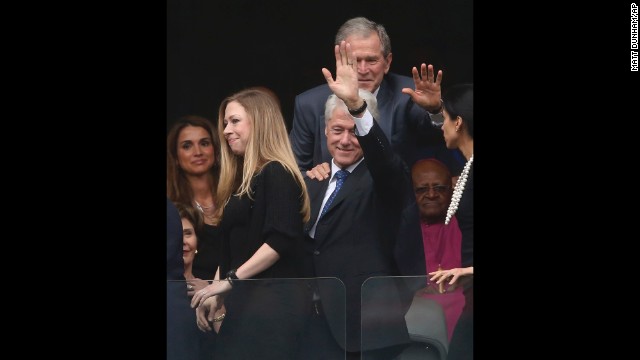 Former Presidents Bill Clinton and George W. Bush wave
during the memorial service. Chelsea Clinton is at left.
Former Presidents Bill Clinton and George W. Bush wave
during the memorial service. Chelsea Clinton is at left.
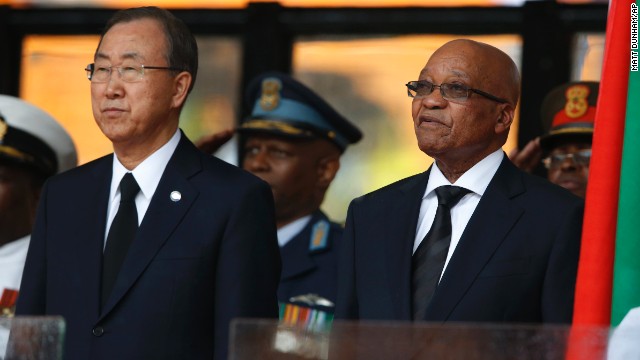 U.N. Secretary-General Ban Ki-moon, left, and South
African President Jacob Zuma stand during the memorial service.
U.N. Secretary-General Ban Ki-moon, left, and South
African President Jacob Zuma stand during the memorial service.
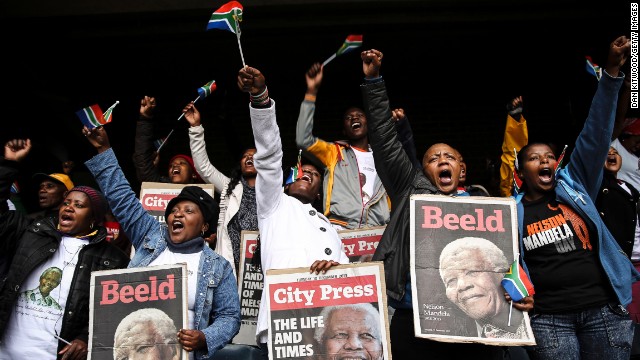 People watch a telecast of the memorial service inside
Orlando Stadium in Soweto, which played an important role in the uprisings
against apartheid.
People watch a telecast of the memorial service inside
Orlando Stadium in Soweto, which played an important role in the uprisings
against apartheid.
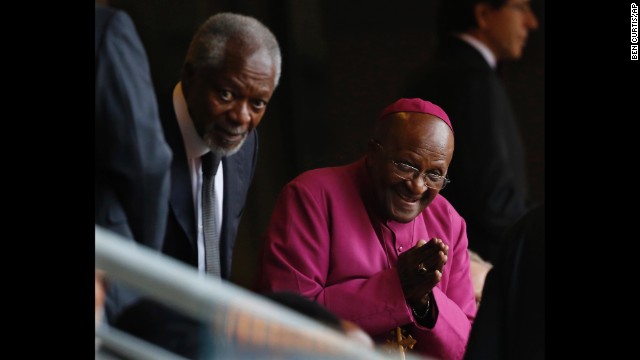 Former Archbishop Desmond Tutu, right, arrives with former
U.N. Secretary-General Kofi Annan at FNB Stadium.
Former Archbishop Desmond Tutu, right, arrives with former
U.N. Secretary-General Kofi Annan at FNB Stadium.
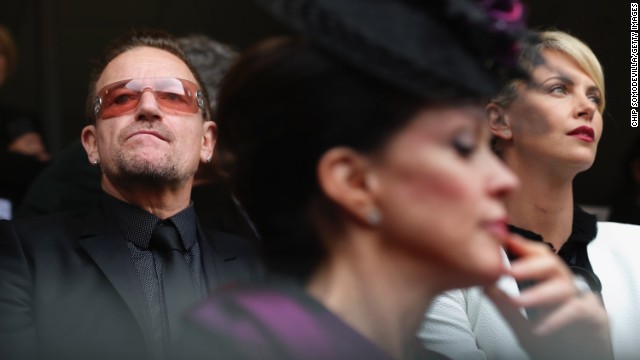 Singer Bono and actress Charlize Theron attend the
memorial service.
Singer Bono and actress Charlize Theron attend the
memorial service.
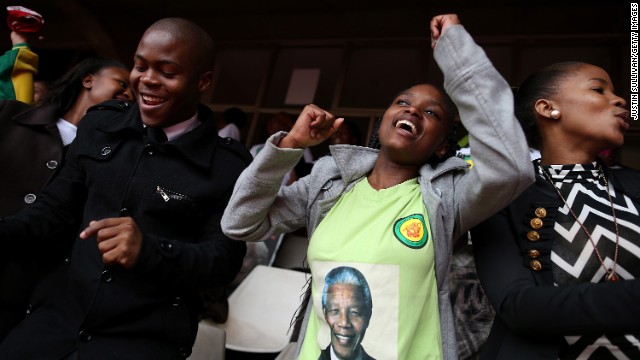 People celebrate Mandela at a telecast of the memorial
service at Ellis Park in Johannesburg.
People celebrate Mandela at a telecast of the memorial
service at Ellis Park in Johannesburg.
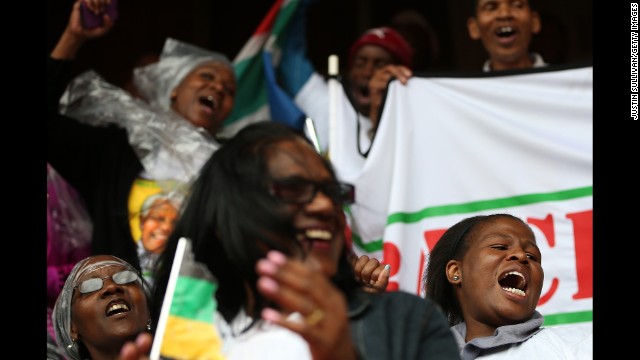 People sing and dance at Ellis Park in
Johannesburg.
People sing and dance at Ellis Park in
Johannesburg.
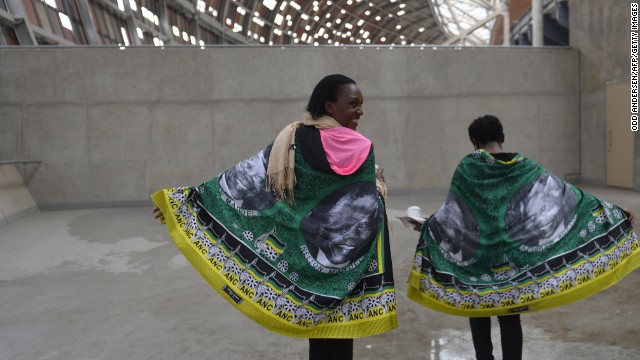 Women draped in flags printed with Mandela's face arrive
at FNB Stadium.
Women draped in flags printed with Mandela's face arrive
at FNB Stadium.
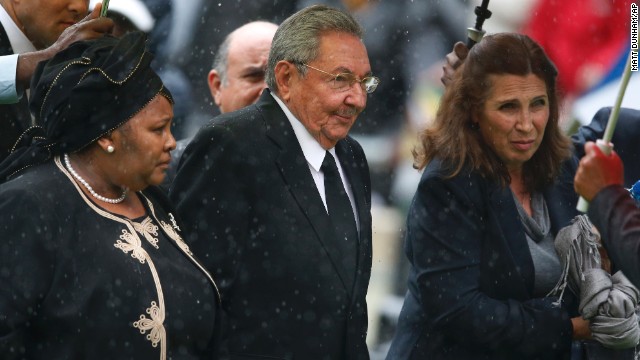 Cuban President Raul Castro arrives for the memorial
service.
Cuban President Raul Castro arrives for the memorial
service.
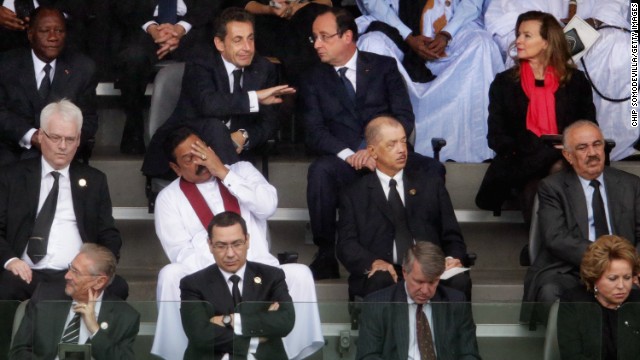 World leaders, including former French President Nicolas
Sarkozy, top second left, and French President Francois Hollande, top second
right, attend the memorial service.
World leaders, including former French President Nicolas
Sarkozy, top second left, and French President Francois Hollande, top second
right, attend the memorial service.
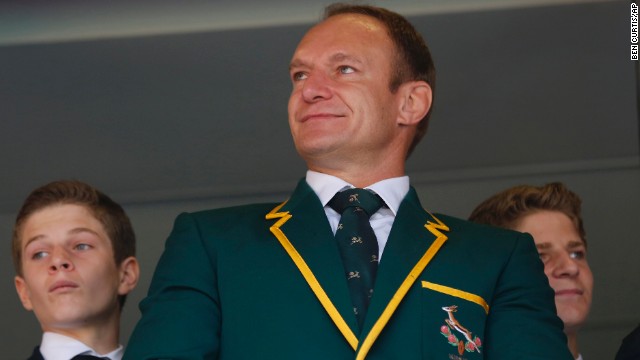 South Africa Rugby Union captain Francois Pienaar waits
for the memorial service to begin.
South Africa Rugby Union captain Francois Pienaar waits
for the memorial service to begin.
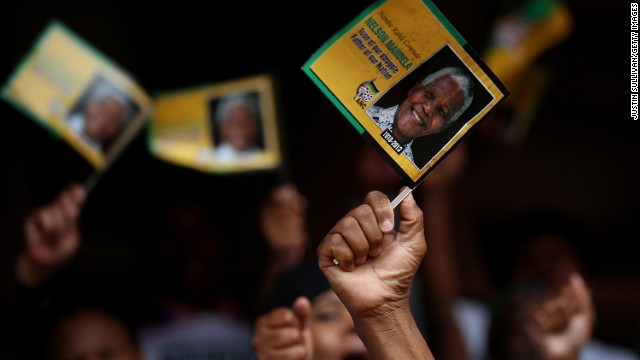 Mourners wave flags at a telecast of the memorial service
at Ellis Park in Johannesburg.
Mourners wave flags at a telecast of the memorial service
at Ellis Park in Johannesburg.
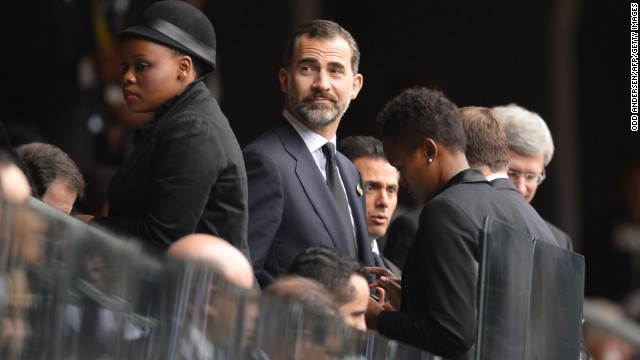 Spain's Prince Felipe arrives at FNB Stadium.
Spain's Prince Felipe arrives at FNB Stadium.
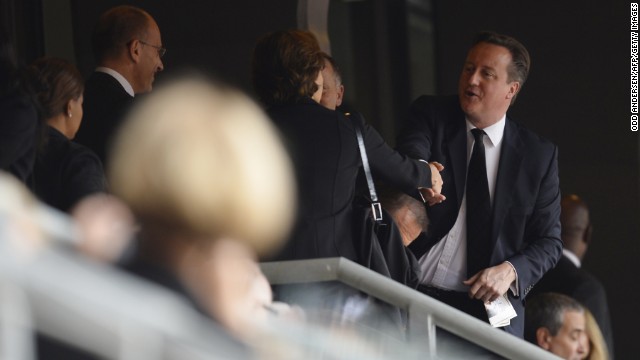 British Prime Minister David Cameron arrives for the
memorial service.
British Prime Minister David Cameron arrives for the
memorial service.
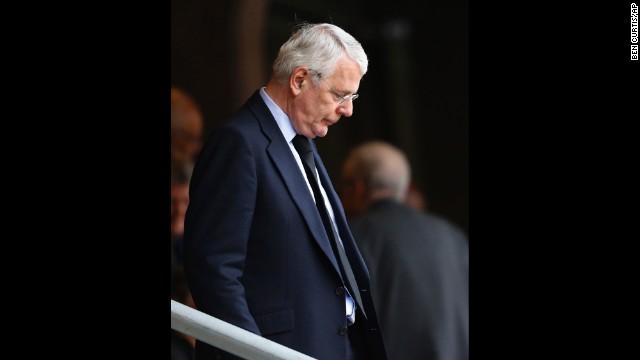 Former British Prime Minister John Major arrives for the
memorial service.
Former British Prime Minister John Major arrives for the
memorial service.
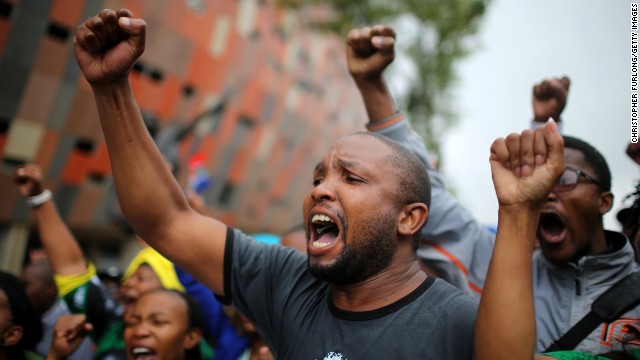 Members of the public sing and dance as they arrive for
the memorial service at FNB Stadium.
Members of the public sing and dance as they arrive for
the memorial service at FNB Stadium.
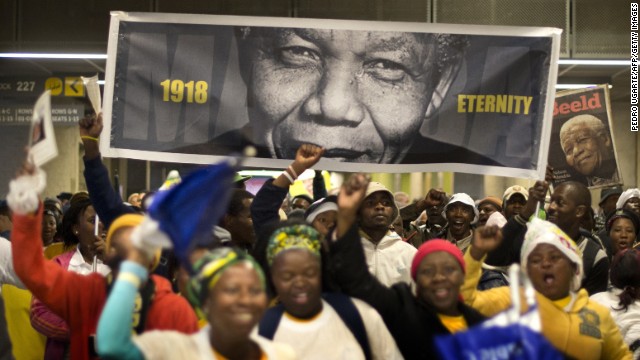 People arrive at FNB Stadium before the memorial
service.
People arrive at FNB Stadium before the memorial
service.
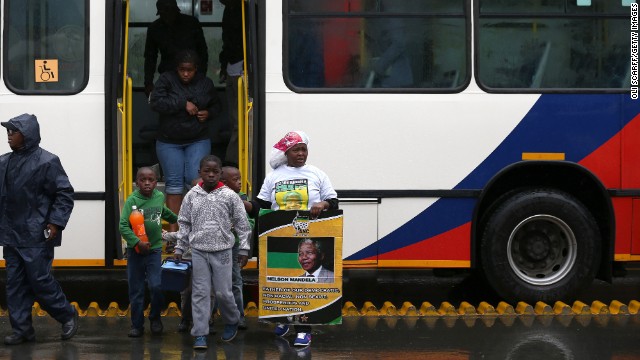 Members of the public make their way to the memorial
service at FNB Stadium.
Members of the public make their way to the memorial
service at FNB Stadium.
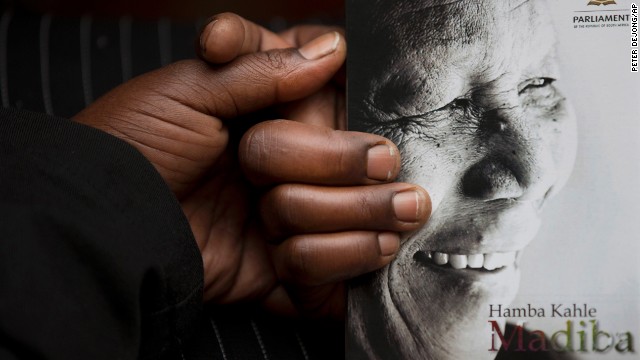 A man clutches the official program in
Johannesburg.
A man clutches the official program in
Johannesburg.
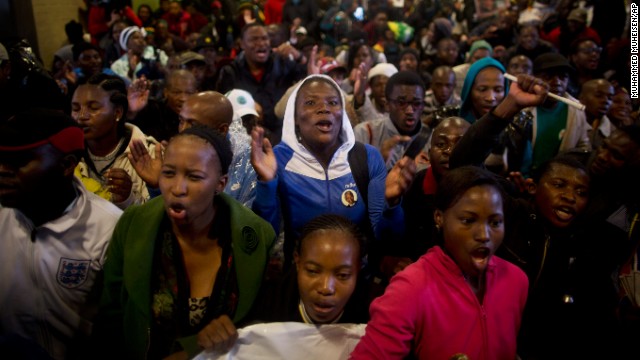 Mourners sing as they take shelter from the rain in the
hallways of FNB Stadium.
Mourners sing as they take shelter from the rain in the
hallways of FNB Stadium.
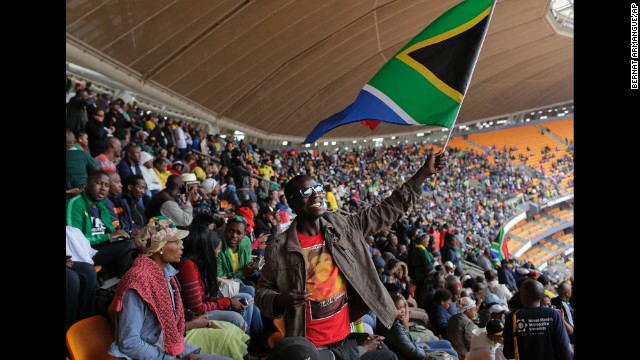 A man waves a South African flag at FNB Stadium.
A man waves a South African flag at FNB Stadium.
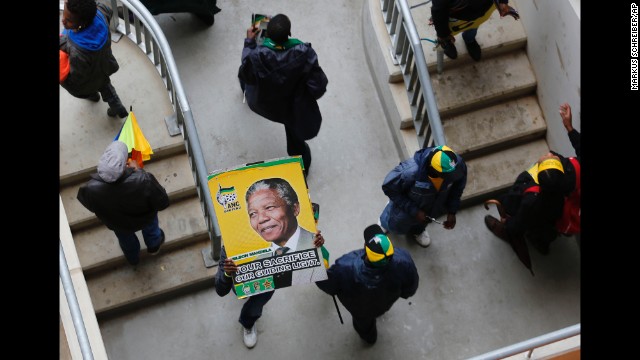 People walk around the FNB Stadium in Johannesburg.
People walk around the FNB Stadium in Johannesburg.
Nelson Mandela memorial service
Nelson Mandela memorial service
Nelson Mandela memorial service
Nelson Mandela memorial service
Nelson Mandela memorial service
Nelson Mandela memorial service
Nelson Mandela memorial service
Nelson Mandela memorial service
Nelson Mandela memorial service
Nelson Mandela memorial service
Nelson Mandela memorial service
Nelson Mandela memorial service
Nelson Mandela memorial service
Nelson Mandela memorial service
Nelson Mandela memorial service
Nelson Mandela memorial service
Nelson Mandela memorial service
Nelson Mandela memorial service
Nelson Mandela memorial service
Nelson Mandela memorial service
Nelson Mandela memorial service
Nelson Mandela memorial service
Nelson Mandela memorial service
Nelson Mandela memorial service
Nelson Mandela memorial service
Nelson Mandela memorial service
Nelson Mandela memorial service
Nelson Mandela memorial service
Nelson Mandela memorial service
Nelson Mandela memorial service
Nelson Mandela memorial service
Nelson Mandela memorial service
Nelson Mandela memorial service
Nelson Mandela memorial service
Nelson Mandela memorial service
Nelson Mandela memorial service
Nelson Mandela memorial service
Nelson Mandela memorial service
Nelson Mandela memorial service
Nelson Mandela memorial service
Nelson Mandela memorial service
HIDE CAPTION
Like Gandhi, he would lead a
resistance movement -- a movement that at its start held little prospect of
success. Like King, he would give potent voice to the claims of the oppressed,
and the moral necessity of racial justice. He would endure a brutal imprisonment
that began in the time of Kennedy and Khrushchev, and reached the final days of
the Cold War.
Emerging from prison, without
force of arms, he would -- like Lincoln -- hold his country together when it
threatened to break apart. Like America's founding fathers, he would erect a
constitutional order to preserve freedom for future generations -- a commitment
to democracy and rule of law ratified not only by his election, but by his
willingness to step down from power.
Given the sweep of his life, and
the adoration that he so rightly earned, it is tempting then to remember Nelson
Mandela as an icon, smiling and serene, detached from the tawdry affairs of
lesser men.
But Madiba himself strongly
resisted such a lifeless portrait. Instead, he insisted on sharing with us his
doubts and fears; his miscalculations along with his victories. "I'm not a
saint," he said, "unless you think of a saint as a sinner who keeps on
trying."
It was precisely because he could
admit to imperfection, because he could be so full of good humor, even mischief,
despite the heavy burdens he carrie, that we loved him so. He was not a bust
made of marble; he was a man of flesh and blood -- a son and husband, a father
and a friend.
That is why we learned so much
from him; that is why we can learn from him still. For nothing he achieved was
inevitable. In the arc of his life, we see a man who earned his place in history
through struggle and shrewdness; persistence and faith. He tells us what's
possible not just in the pages of dusty history books, but in our own lives as
well.
Mandela showed us the power of
action; of taking risks on behalf of our ideals. Perhaps Madiba was right that
he inherited, "a proud rebelliousness, a stubborn sense of fairness" from his
father.
Certainly he shared with
millions of black and colored South Africans the anger born of, "a thousand
slights, a thousand indignities, a thousand unremembered moments ... a desire to
fight the system that imprisoned my people."
But like other early giants of
the ANC -- the Sisulus and Tambos -- Madiba disciplined his anger; and channeled
his desire to fight into organization, and platforms, and strategies for action,
so men and women could stand up for their dignity. Moreover, he accepted the
consequences of his actions, knowing that standing up to powerful interests and
injustice carries a price.
"I have fought against white
domination and I have fought against black domination," he said at his 1964
trial. "I've cherished the ideal of a democratic and free society in which all
persons live together in harmony and with equal opportunities. It is an ideal
which I hope to live for and to achieve. But if needs be, it is an ideal for
which I am prepared to die."
Mandela taught us the power of
action, but also ideas; the importance of reason and arguments; the need to
study not only those you agree with, but those who you don't. He understood that
ideas cannot be contained by prison walls, or extinguished by a sniper's
bullet.
He turned his trial into an
indictment of apartheid because of his eloquence and passion, but also his
training as an advocate. He used decades in prison to sharpen his arguments, but
also to spread his thirst for knowledge to others in the movement. And he
learned the language and customs of his oppressor so that one day he might
better convey to them how their own freedom depended upon his.
Mandela demonstrated that action
and ideas are not enough; no matter how right, they must be chiseled into laws
and institutions. He was practical, testing his beliefs against the hard surface
of circumstance and history. On core principles he was unyielding, which is why
he could rebuff offers of conditional release, reminding the apartheid regime
that, "prisoners cannot enter into contracts."
But as he showed in painstaking
negotiations to transfer power and draft new laws, he was not afraid to
compromise for the sake of a larger goal. And because he was not only a leader
of a movement, but a skillful politician, the constitution that emerged was
worthy of this multiracial democracy; true to his vision of laws that protect
minority as well as majority rights, and the precious freedoms of every South
African.
Finally, Mandela understood the
ties that bind the human spirit. There is a word in South Africa -- Ubuntu -
that describes his greatest gift: his recognition that we are all bound together
in ways that can be invisible to the eye; that there is a oneness to humanity;
that we achieve ourselves by sharing ourselves with others, and caring for those
around us.
We can never know how much of
this was innate in him, or how much of was shaped and burnished in a dark,
solitary cell. But we remember the gestures, large and small - introducing his
jailers as honored guests at his inauguration; taking the pitch in a springbok
uniform; turning his family's heartbreak into a call to confront HIV/AIDS - that
revealed the depth of his empathy and understanding.
He not only embodied Ubuntu; he
taught millions to find that truth within themselves. It took a man like Madiba
to free not just the prisoner, but the jailer as well; to show that you must
trust others so that they may trust you; to teach that reconciliation is not a
matter of ignoring a cruel past, but a means of confronting it with inclusion,
generosity and truth. He changed laws, but also hearts.
For the people of South Africa,
for those he inspired around the globe, Madiba's passing is rightly a time of
mourning, and a time to celebrate his heroic life. But I believe it should also
prompt in each of us a time for self-reflection. With honesty, regardless of our
station or circumstance, we must ask: how well have I applied his lessons in my
own life?
It is a question I ask myself as
a man and as a President. We know that like South Africa, the United States had
to overcome centuries of racial subjugation. As was true here, it took the
sacrifice of countless people -- known and unknown -- to see the dawn of a new
day. Michelle and I are the beneficiaries of that struggle.
But in America and South Africa,
and countries around the globe, we cannot allow our progress to cloud the fact
that our work is not done. The struggles that follow the victory of formal
equality and universal franchise may not be as filled with drama and moral
clarity as those that came before, but they are no less important.
For around the world today, we
still see children suffering from hunger, and disease; run-down schools, and few
prospects for the future. Around the world today, men and women are still
imprisoned for their political beliefs; and are still persecuted for what they
look like, or how they worship, or who they love.
Nelson Mandela reminds us that it always seems impossible until it is
done
President Barack Obama
We, too, must act on behalf of
justice. We, too, must act on behalf of peace. There are too many of us who
happily embrace Madiba's legacy of racial reconciliation, but passionately
resist even modest reforms that would challenge chronic poverty and growing
inequality.
There are too many leaders who
claim solidarity with Madiba's struggle for freedom, but do not tolerate dissent
from their own people. And there are too many of us who stand on the sidelines,
comfortable in complacency or cynicism when our voices must be heard.
The questions we face today --
how to promote equality and justice; to uphold freedom and human rights; to end
conflict and sectarian war -- do not have easy answers. But there were no easy
answers in front of that child in Qunu.
Nelson Mandela reminds us that
it always seems impossible until it is done. South Africa shows us that is true.
South Africa shows us we can change. We can choose to live in a world defined
not by our differences, but by our common hopes. We can choose a world defined
not by conflict, but by peace and justice and opportunity.
We will never see the likes of
Nelson Mandela again. But let me say to the young people of Africa, and young
people around the world -- you can make his life's work your own. Over 30 years
ago, while still a student, I learned of Mandela and the struggles in this land.
It stirred something in me.
It woke me up to my
responsibilities -- to others, and to myself -- and set me on an improbable
journey that finds me here today. And while I will always fall short of Madiba's
example, he makes me want to be better. He speaks to what is best inside us.
After this great liberator is laid to rest; when we have returned to our cities
and villages, and rejoined our daily routines, let us search then for his
strength -- for his largeness of spirit -- somewhere inside ourselves.
And when the night grows dark,
when injustice weighs heavy on our hearts, or our best laid plans seem beyond
our reach -- think of Madiba, and the words that brought him comfort within the
four walls of a cell:
It matters not how strait the
gate,
How charged with punishments the
scroll,
I am the master of my fate:
I am the captain of my soul.
What a great soul it was. We
will miss him deeply. May God bless the memory of Nelson Mandela. May God bless
the people of South Africa

 People take shelter under blankets and umbrellas during the
memorial service for former South African President Nelson Mandela at FNB
Stadium in Johannesburg on Tuesday, December 10. Thousands of South Africans and
more than 90 heads of state gathered to honor the revered leader, who died
Thursday, December 5. He was 95.
People take shelter under blankets and umbrellas during the
memorial service for former South African President Nelson Mandela at FNB
Stadium in Johannesburg on Tuesday, December 10. Thousands of South Africans and
more than 90 heads of state gathered to honor the revered leader, who died
Thursday, December 5. He was 95.
 Cuban leader Raul Castro addresses the state memorial
service for Mandela.
Cuban leader Raul Castro addresses the state memorial
service for Mandela.
 A South African soldier watches the flame of the torch
before entering the field during the memorial service.
A South African soldier watches the flame of the torch
before entering the field during the memorial service.
 President Barack Obama addresses the crowd during the
memorial service.
President Barack Obama addresses the crowd during the
memorial service.
 Obama shakes hands with Cuban President Raul Castro just
before speaking.
Obama shakes hands with Cuban President Raul Castro just
before speaking.
 South Africans cheer during the memorial service.
South Africans cheer during the memorial service.
 Dignitaries from all over the world stand at the beginning
of the memorial service.
Dignitaries from all over the world stand at the beginning
of the memorial service.
 A boy looks up during the memorial service at FNB Stadium.
He has "RIP Nelson Mandela" painted on his face.
A boy looks up during the memorial service at FNB Stadium.
He has "RIP Nelson Mandela" painted on his face.
 A man displays a sign with pictures of Mandela during the
memorial service.
A man displays a sign with pictures of Mandela during the
memorial service.
 People take shelter under umbrellas at FNB Stadium.
People take shelter under umbrellas at FNB Stadium.
 A man raises his fist during the memorial service.
A man raises his fist during the memorial service.
 This handout photo released by Mexican presidency press
office shows (L-R) Spanish Prince Felipe de Borbon, Mexican President Enrique
Pena Nieto an Canadian Prime Minister Stephen Harper on December 10, 2013, while
attending the funeral of Nelson Mandela at Soccer City stadium in Johannesburg,
South Africa. AFP PHOTO/ MEXICAN PRESIDENCYHO/AFP/Getty Images
This handout photo released by Mexican presidency press
office shows (L-R) Spanish Prince Felipe de Borbon, Mexican President Enrique
Pena Nieto an Canadian Prime Minister Stephen Harper on December 10, 2013, while
attending the funeral of Nelson Mandela at Soccer City stadium in Johannesburg,
South Africa. AFP PHOTO/ MEXICAN PRESIDENCYHO/AFP/Getty Images
 Mandela's ex-wife, Winnie Madikizela-Mandela, left, and
his widow, Graca Machel, right, sit near each other during the memorial
service.
Mandela's ex-wife, Winnie Madikizela-Mandela, left, and
his widow, Graca Machel, right, sit near each other during the memorial
service.
 Mandela's face looms large on a billboard inside FNB
Stadium.
Mandela's face looms large on a billboard inside FNB
Stadium.
 Girls dance during the memorial service at FNB
stadium.
Girls dance during the memorial service at FNB
stadium.
 Mourners pause for a prayer during the memorial
service.
Mourners pause for a prayer during the memorial
service.
 Mandla Mandela, left, grandson of Nelson Mandela, attends
the memorial service.
Mandla Mandela, left, grandson of Nelson Mandela, attends
the memorial service.
 Queen Rania of Jordan speaks with former President George
W. Bush and his wife, Laura, during the memorial service.
Queen Rania of Jordan speaks with former President George
W. Bush and his wife, Laura, during the memorial service.
 Former Secretary of State Hillary Clinton arrives for the
memorial service.
Former Secretary of State Hillary Clinton arrives for the
memorial service.
 Former Presidents Bill Clinton and George W. Bush wave
during the memorial service. Chelsea Clinton is at left.
Former Presidents Bill Clinton and George W. Bush wave
during the memorial service. Chelsea Clinton is at left.
 U.N. Secretary-General Ban Ki-moon, left, and South
African President Jacob Zuma stand during the memorial service.
U.N. Secretary-General Ban Ki-moon, left, and South
African President Jacob Zuma stand during the memorial service.
 People watch a telecast of the memorial service inside
Orlando Stadium in Soweto, which played an important role in the uprisings
against apartheid.
People watch a telecast of the memorial service inside
Orlando Stadium in Soweto, which played an important role in the uprisings
against apartheid.
 Former Archbishop Desmond Tutu, right, arrives with former
U.N. Secretary-General Kofi Annan at FNB Stadium.
Former Archbishop Desmond Tutu, right, arrives with former
U.N. Secretary-General Kofi Annan at FNB Stadium.
 Singer Bono and actress Charlize Theron attend the
memorial service.
Singer Bono and actress Charlize Theron attend the
memorial service.
 People celebrate Mandela at a telecast of the memorial
service at Ellis Park in Johannesburg.
People celebrate Mandela at a telecast of the memorial
service at Ellis Park in Johannesburg.
 People sing and dance at Ellis Park in
Johannesburg.
People sing and dance at Ellis Park in
Johannesburg.
 Women draped in flags printed with Mandela's face arrive
at FNB Stadium.
Women draped in flags printed with Mandela's face arrive
at FNB Stadium.
 Cuban President Raul Castro arrives for the memorial
service.
Cuban President Raul Castro arrives for the memorial
service.
 World leaders, including former French President Nicolas
Sarkozy, top second left, and French President Francois Hollande, top second
right, attend the memorial service.
World leaders, including former French President Nicolas
Sarkozy, top second left, and French President Francois Hollande, top second
right, attend the memorial service.
 South Africa Rugby Union captain Francois Pienaar waits
for the memorial service to begin.
South Africa Rugby Union captain Francois Pienaar waits
for the memorial service to begin.
 Mourners wave flags at a telecast of the memorial service
at Ellis Park in Johannesburg.
Mourners wave flags at a telecast of the memorial service
at Ellis Park in Johannesburg.
 Spain's Prince Felipe arrives at FNB Stadium.
Spain's Prince Felipe arrives at FNB Stadium.
 British Prime Minister David Cameron arrives for the
memorial service.
British Prime Minister David Cameron arrives for the
memorial service.
 Former British Prime Minister John Major arrives for the
memorial service.
Former British Prime Minister John Major arrives for the
memorial service.
 Members of the public sing and dance as they arrive for
the memorial service at FNB Stadium.
Members of the public sing and dance as they arrive for
the memorial service at FNB Stadium.
 People arrive at FNB Stadium before the memorial
service.
People arrive at FNB Stadium before the memorial
service.
 Members of the public make their way to the memorial
service at FNB Stadium.
Members of the public make their way to the memorial
service at FNB Stadium.
 A man clutches the official program in
Johannesburg.
A man clutches the official program in
Johannesburg.
 Mourners sing as they take shelter from the rain in the
hallways of FNB Stadium.
Mourners sing as they take shelter from the rain in the
hallways of FNB Stadium.
 A man waves a South African flag at FNB Stadium.
A man waves a South African flag at FNB Stadium.
 People walk around the FNB Stadium in Johannesburg.
People walk around the FNB Stadium in Johannesburg.









































